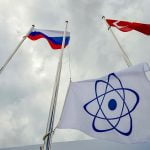Much like US Senator John McCain’s visit to Bulgaria last summer to try and halt the Russian-backed South Stream pipeline, the US dispatched State Department official responsible for energy security, Amos J. Hochstein, to visit Croatia recently to prevent the sale of Hungarian MOL’s 49% stake in Croatia’s largest energy company INA to Russia’s Gazprom Neft. Hochstein also met Hungarian Foreign Minister Peter Szijjarto in Washington in October.
The US is dissatisfied with the growing closeness between Hungary and the Kremlin over energy.
Hungarian Prime Minister Viktor Orban has been a supporter of South Stream, noting that the planned gas pipeline bypassing Ukraine would increase his country’s energy security and reduce transit risks.
Defying the EU, the Hungarian parliament approved on November 3 a law which allows building South Stream without approval from Brussels. The European Commission has already demanded an explanation from Hungarian authorities.
Moreover, Hungary stopped the reverse natural gas to Ukraine in September, effectively pulling out of an EU-backed effort to support Kiev during the latter’s dispute with Moscow.
In a sign of growing exasperation with Orban, the US government has already blacklisted six people with ties to the government in EU-member Hungary from entering the US, accusing them of involvement in corruption.
Washington is now worried that if MOL sells its 49% stake in INA, Gazprom would gain a strategic foothold inside the EU, which is already its biggest customer for natural gas. INA has also bid in the first licensing round for hydrocarbon exploration and production in Croatia’s Adriatic Sea.
A source close to Gazprom told New Europe on November 3 that Gazprom Neft got the green light from the Croatian government that it was acceptable to buy INA after a visit of Gazprom CEO Alexei Miller to Zagreb on July 9.
Regarding US pressure on Hungary and Croatia not to sell INA to Gazprom Neft, the source said the Russian company has not received any negative feedback from the Hungarians yet. Gazprom Neft is currently evaluating INA’s assets, financial and management reports, geology reports in means of production as well as INA’s assets in Croatia and Syria.
However, the source said that if a deal is reached for Gazprom Neft to buy INA, the agreement would definitely have to be approved by the European Commission. “We will have to deal with the Commission and probably the Commission will block it because it’s a $2-3 billion deal. It’s a strategic move and I don’t think the Commission will let us do that. But right now we’re not even thinking about it because we’re the very beginning of the deal. We’re studying the documents but we’re not even close,” the source said.
At the moment the Russian government and Gazprom are preoccupied with Russian President Vladimir Putin’s visit to China on November 9-11. “Right now at the governmental level this Croatian situation is being forgotten because Vladimir Putin is going to China and everybody switched to China projects over the last two weeks,” the source said. “You have a plethora of projects and you have to shout out loud for the government to pay attention to your projects right now and we are not shouting that loud. Everybody’s focused on China and everybody’s going to China.”
follow on twitter @energyinsider
Previously on Energy Insider:
EU Subsidy Keeps Russian Gas Coming to Ukraine
Gazprom Sees Bigger Role in Austria
Putin Pushes South Stream In Belgrade, Milan







